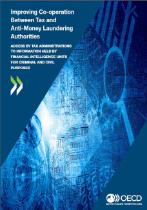Tax and crime
Improving Co-operation between Tax and Anti-Money Laundering Authorities: Access by tax administrations to information held by financial intelligence units for criminal and civil purposes
 |
Financial crimes, including tax crimes, threaten the strategic, political and economic interests of both developed and developing countries and undermine confidence in the global financial system. In a world of limited resources and increasing complexity government authorities must work closely together in a “whole of government” approach to best address these challenges.
Published on 18 September 2015
|
About
Financial crimes, including tax crimes, threaten the strategic, political and economic interests of both developed and developing countries and undermine confidence in the global financial system. In a world of limited resources and increasing complexity government authorities must work closely together in a “whole of government” approach to best address these challenges.
This report uses survey data to analyse the levels of co-operation between the authorities combatting serious financial crimes such as tax crimes, bribery corruption, money laundering and terrorism financing. More specifically, it assesses various models for the sharing of Suspicious Transaction Reports (STRs) by the Financial Intelligence Unit (FIU) with the tax administration, both for criminal and civil purposes. It finds that there are significant potential benefits from greater co-operation, with each authority pooling their knowledge and skills. The report subsequently recommends that subject to the necessary safeguards, tax administrations should have the fullest possible access to the STRs received by the FIU in their jurisdiction.
Press release
Engage
- For more information, please contact ctp.contact@oecd.org
- Follow us on @OECDtax
Related Documents